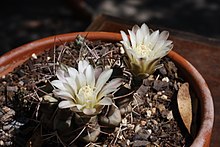Gymnocalycium gibbosum is a species of Gymnocalycium from Argentina.[2]
| Gymnocalycium gibbosum | |
|---|---|

| |
| Scientific classification | |
| Kingdom: | Plantae |
| Clade: | Tracheophytes |
| Clade: | Angiosperms |
| Clade: | Eudicots |
| Order: | Caryophyllales |
| Family: | Cactaceae |
| Subfamily: | Cactoideae |
| Genus: | Gymnocalycium |
| Species: | G. gibbosum
|
| Binomial name | |
| Gymnocalycium gibbosum (Haw.) Pfeiff. ex Mittler 1845
| |
| Synonyms | |
| |

Description
editGymnocalycium gibbosum usually grows singly with dark blue-green, spherical to short cylindrical shoots that reach a diameter of 10 to 12 centimeters. The twelve to 19 ribs are noticeably notched. The one to three central spines are often missing. The seven to 15 straight, stiff, light brown to almost black marginal spines are up to 3.5 centimeters long.
The white or sometimes reddish flowers are up to 6 centimeters long. The dark green fruits are club-shaped.[3]
Subspecies
editThere are two recognized subspecies.[4]
| Image | Name | Distribution |
|---|---|---|
| Gymnocalycium gibbosum subsp. borthii (Koop ex H.Till) G.J.Charles | Argentina (San Luis) | |
| Gymnocalycium gibbosum subsp. gibbosum | Argentina |
Distribution
editGymnocalycium gibbosum is widespread from central to southern Argentina up to altitudes of 1000 meters.
Taxonomy
editThe first description as Cactus gibbosus was made in 1816 by Adrian Hardy Haworth.[5] Ludwig Mittler placed the species in the genus Gymnocalycium in 1844.[6] Other nomenclature synonyms are Cereus gibbosus (Haw.) Sweet (1826), Echinocactus gibbosus (Haw.) DC. (1828) and Cereus gibbosus (Haw.) Pfeiff. (1837, nom. illegal).
References
edit- ^ "The IUCN Red List of Threatened Species". IUCN Red List of Threatened Species. 2010-09-21. Retrieved 2023-12-08.
- ^ "Gymnocalycium gibbosum in Tropicos".
- ^ Anderson, Edward F.; Eggli, Urs (2005). Das grosse Kakteen-Lexikon (in German). Stuttgart (Hohenheim): Ulmer. p. 316. ISBN 3-8001-4573-1.
- ^ Anderson, Edward F.; Eggli, Urs (2005). Das grosse Kakteen-Lexikon (in German). Stuttgart (Hohenheim): Ulmer. ISBN 3-8001-4573-1.
- ^ Edwards, Sydenham; Ridgway, James (1816). "The Botanical register". Printed for James Ridgway. ISSN 0268-4136. Retrieved 2023-12-12.
- ^ Korotkova, Nadja; Aquino, David; Arias, Salvador; Eggli, Urs; Franck, Alan; Gómez-Hinostrosa, Carlos; Guerrero, Pablo C.; Hernández, Héctor M.; Kohlbecker, Andreas; Köhler, Matias; Luther, Katja; Majure, Lucas C.; Müller, Andreas; Metzing, Detlev; Nyffeler, Reto; Sánchez, Daniel; Schlumpberger, Boris; Berendsohn, Walter G. (2021-08-31). "Cactaceae at Caryophyllales.org – a dynamic online species-level taxonomic backbone for the family". Willdenowia. 51 (2). doi:10.3372/wi.51.51208. ISSN 0511-9618.
External links
edit- Media related to Gymnocalycium gibbosum at Wikimedia Commons
- Data related to Gymnocalycium gibbosum at Wikispecies
